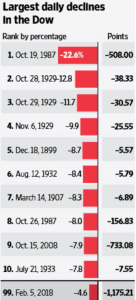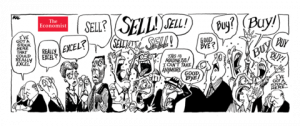We as humans are hardwired to believe in a story. Any story that has enough information to give us an adequate illusion of control. This human bias has gone into overdrive as the past few days have not been good for the stock market. If you combine last Friday and yesterday’s sell-off, the S&P 500 index was down -6.1% in total. Not to our surprise here at Zoe, we got a rush of inbound questions from our community, so I figured it was worth addressing it.
Is this sell-off a big deal? Yes and no.



Yes – if we look at the daily move in isolation.
Volatility, measured by the VIX index, went above the 45 level mark, which has only occurred 91 times since 1990 (or 1% of the time). If we look at the S&P 500 index, there have only ever been 144 days in its history that saw -4% drops. So yes, yesterday was undoubtedly a big daily drop. Having said that, I hear a lot of noise about the Dow Jones Index had the biggest point drop ever. However, absolute point changes do not really tell us anything. In percentage terms, the Dow fell -4.6% today, which doesn’t even put it on the top 50 list of all time. Just to put that number into context, on Black Monday on Oct 19, 1987, the Dow index fell -22.6%.
No. If we look at the sell-off from a yearly perspective, the sell-off looks, well, fairly normal.
Over the last 38 calendar years, the average intra-year drop was -14%. In other words, even if markets were to fall by an additional 5 to 6% from yesterday’s level in the coming weeks, it would be still be considered a perfectly “normal” intra-yearly correction.
So what drove the sell-off?
I’ve heard some say that yesterday was an “interest rate sensitive” sell-off as a result of rising bond yields last week. Data doesn’t really support that as treasury yields actually fell yesterday and the worst performing stock sectors included technology, which is not an interest rate sensitive sector.
Is it stocks valuation? Valuation does not drive short-term prices. If it did, we would have seen this sell-off already at some point the last 12 months, since valuations were already well above historical average.
I know we want to always have a reason for large intraday moves, but sometimes there is no good reason.



Should we worry going forward?
Ok, the recent sell-off is not something we see every day, but it is also not something that has never happened before, so where do we go from here? Should we be worried? It depends on who “we” is.
- Are you a day-trader? Then, yes you should worry as this means your job might be at risk if you were positioned long in this market.
- Are you a 40-year-old doctor in Illinois that invests towards retirement? Then today’s sell-off should mean absolutely nothing. If anything it means that expected returns on the equity part of your portfolio now look a little bit brighter, since it lowers the average cost of the stocks in your portfolio, which you will be buying for the next few decades.
- Are you a 65-year-old retiring this year? This means it’s important that you have a steady hand and do not make drastic moves based on the last few days’ price action.
The key message here, no matter who you are is this: Turn off the TV. Take a deep breath. As I mentioned today on CNBC, don’t let the stock market short-term volatility dictate your strategy. Don’t have a strategy yet? It’s probably a good idea to schedule some time with an advisor to make sure you align your goals with a well-thought-out investment plan.
If you enjoyed this post, check out North Korea Escalation: What Are The Investment Implications?



